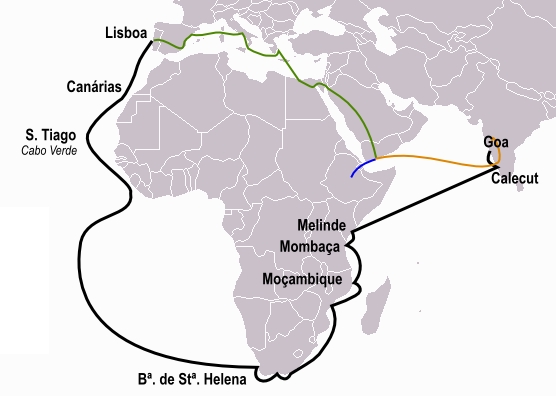The Spy who Never came back
Pêro da Covilhã
by Frederic "Jim" Silva
In the true tales of high adventure the story of Marco Polo's travels have been indelibly recorded in history. But few have ever heard of one Pêro da Covilhã.
And yet Pêro da Covilhã's travels and exploits can come a close second to those of Polo. Perhaps one of the reasons for Covilhã's relative obscurity was that he left no written record of his explorations and apart from his letter reporting to his King it was left to others to write of him.
Marco Polo's journey was in the years around 1270, at the time when Kublai Khan was on the throne as Emperor of China. Covilhã's travels took place some 200 years later, around 1480.
The Age of Discovery was in full swing when King John II of Portugal entrusted two men, Pêro da Covilhã and Afonso da Paiva, to go east to explore and discover on his behalf. Yes, you can even say - to spy. Unlike other ongoing discoveries this was not to be the usual expensive sea-borne expedition, but rather a surreptitious and unobtrusive overland trip. One reason why Covilhã was chosen was because of his knowledge of Arabic which was then still commonly used in parts of lberia.
The King's instruction to the men was twofold. First, Christendom was desperate to prevail over Islam and the explorers were told to make contact with a legendary King called Prester John and to seek a Christian alliance with him against Islam. Second, it would be useful to know the exact geographical location where many of the prized spices came from.
Where did cinnamon originate? Cloves? Mace? Nutmeg? and Pepper? From where exactly did the Venetians and their Middle Eastern trading partners get their goods?

The two men set off. They travelled through Barcelona, Naples and Rhodes. They made their way to Egypt, Alexandria and Cairo, and there they joined an Arab caravan to Aden. They went right to the extreme tip of the Saudi Arabian peninsula. It must have been high adventure as new and unknown worlds opened.
At Aden the two men parted company. Paiva proceeded to Ethiopia where he was never heard from again. It was thought that he soon died there. Covilhã went on to India and landed at Calicut. It was in a subsequent letter to his King that he pointed to Calicut as a leading trading post on India's west coast and it was this information that later guided Vasco da Gama to and there.
Covilhã made his way back to Cairo via Goa and Ormuz and there he made contact with emissaries of his King. He reported by letter on his travels thus far and in turn was instructed to carry on in his search for Prester John.
Covilhã straddled the Red Sea. He reached Jeddah, Mecca and Medina before finally reaching Ethiopia, which legend indicated was the home of Prester John.
Instead of a hoped for powerful Christian King and ally, what he found instead was yet another poor backward African nation practicing variant forms of Christian belief. Nevertheless Covilhã was well received and royally treated with land and honours. The only problem was that he was not ever allowed to leave.
The years passed and in 1520 a Portuguese mission to Ethiopia came across Covilhã, still there after a stay of thirty years. What a re-union it must have been. To hear the voices and language of his countrymen after all this time. To hear of people and events that had taken place. To learn that a sea-borne landing had been made in Calicut. Perhaps finding out that his countrymen had gone even further east to Malacca and China; and that a new King was now on the throne. It must have been like awakening from a Rip Van Winkle sleep of years.
Covilhã in turn supplied his countrymen with information and news on his part of the world. He taught them words from the language and the customs of the people. They dubbed him "An honourable person of merit and credit".
The emissaries now offered to take Covilhã home with them but he refused the invitation. He knew that he would now be a stranger in his land of birth and would not fit in anymore. Moreover, he had a second wife and family in Ethiopia and complications would arise over his first wife and family in Portugal.
Covilhã died a pioneer and respected Patriarch in his home in Africa. He was buried accompanied by the basic Christian rites – with somewhat different ceremonies from what would otherwise have been had they taken place in Portugal.